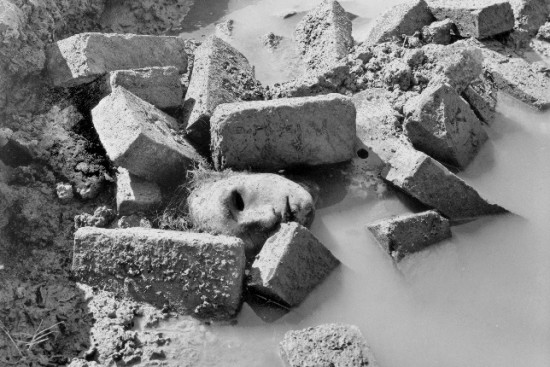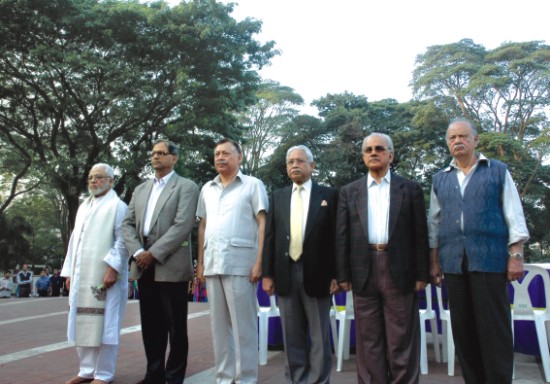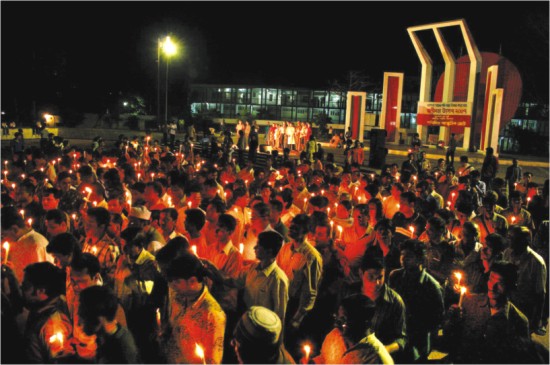
Inside
|
Justice, the General and His Soldier Tazreena Sajjad questions who will take command responsibility in Bangladesh's war crimes trials In January 1988, Col. Yehuda Meir ordered his troops to round up twenty Palestinian men from Hawara and Beita in the West Bank, bind them in handcuffs and blindfolds, and break their bones. The unit commander reporting to Meir passed on the order to his troops, but also told them he did not require them to comply. Some soldiers refrained from doing so, but others carried out the order with such zeal that they broke their truncheons.
The impending possibility of a war crimes trial in Bangladesh to try the alleged perpetrators of the 1971 genocide raises a plethora of pressing questions: Who should be prosecuted? How? Can and should the trial prosecute all those responsible for the genocide and crimes against humanity? How far up the command chain is it possible to go? Would the trial include the prosecution of the Pakistani generals? Is it too late to prosecute? What should the punishment be for war crimes atrocities? While this is by no means an exhaustive list, the central issue surrounding many of these questions which requires greater clarity is that of command responsibility. The 1973 War Crimes Act of Bangladesh (Articles IV and V) recognises the importance of identifying command responsibility. But what does it actually mean? As Meir's case above raises, and what the trials in Bangladesh would also reflect, is that command responsibility involves two fundamental thorny and complex questions. First, can obedience to superior orders be a defence against allegations of war crimes? Second, how far up the chain of command does "command responsibility" reach? And while these questions may be the subject of intense legal debate and scrutiny, in the context of Bangladesh where crimes were ordered and committed by Pakistani officers, collaborators and Bengali auxiliary forces (Al Badr, Al Shams), the answers have overwhelming significance. Origins and development The first attempt at codifying the principle of command responsibility on a multinational level was The Hague Convention (IV) of 1907, Respecting the Laws and Customs of War on Land. Legal precedence for command responsibility was further consolidated in what are known as the Yamashita standard and the Medina standard, both of which inform the doctrine of hierarchical accountability for war crimes. The "Yamashita standard" is based upon the precedent set by the United States Supreme Court where Yamashita was charged with "unlawfully disregarding and failing to discharge his duty as a commander to control the acts of members of his command by permitting them to commit war crimes” in the Phillippines and duly prosecuted. The "Medina standard" is based upon the prosecution of US Army Captain Ernest Medina in connection with the My Lai Massacre during the Vietnam War. In the realm of international law, the Geneva Conventions of 1949 and their Additional Protocols provide for criminal liability based on the accused's position as a commander. On the international level, the doctrine of command responsibility clearly has been extended to civilian authorities exercising control over military forces. In the post-World War II prosecutions in Nuremberg and Tokyo, a number of civilian authorities were convicted of war crimes. More recently, the International Criminal Tribunal for the Former Yugoslavia ("ICTY") and the International Criminal Tribunal for Rwanda ("ICTR") have held civilians criminally liable for the actions of militarised forces under their control. In February 2001, the ICTY found Dario Kordiç, a Bosnian Croat political leader, guilty under a theory of command responsibility for grave breaches of the Geneva Conventions, crimes against humanity, and violations of the laws and customs of war for the actions of Bosnian Croat militia forces operating in central Bosnia. In 1998, at the ICTR, the former Prime Minister of Rwanda, Jean Kambanda, pled guilty to six criminal counts, including genocide and crimes against humanity. He is currently serving a life sentence. The doctrine of command responsibility has recently been codified in Article 28 of the Rome Statute of the ICC. Article 28(a) imposes individual responsibility on military commanders for crimes committed by forces under their effective command and control, if they either knew or, owing to the circumstances at the time, should have known that the forces were committing or about to commit such crimes.
Command responsibility: A closer look In order to hold a military commander, either criminally or civilly liable under the doctrine of command responsibility, the prosecution/plaintiff must prove three elements: 1) those committing the atrocities/war crimes were under the command of the defendant; 2) the commanders knew or should have known, based on the surrounding circumstances at the time, that their subordinates were engaging in impermissible conduct; and 3) the commanders did nothing to prevent or punish those responsible for the commission of such crimes. Command responsibility: application for Bangladesh Second, the domestic trial will irrefutably face the claims of "duress,"such as a threat to execute the subordinate for failure to carry out orders that will be offered in mitigation, in all likelihood by the defence. It is critical for the prosecution to be clear on the fact that the claim of superior orders cannot serve as affirmative defence. In other words, and very simply stated, according to International Humanitarian Law (IHL), a claim of superior orders cannot serve as a defence against an allegation of grave breaches or any of its serious violations such as genocide, war crimes against humanity and war crimes, the very charges on which these perpetrators will be brought forward on court.
The issue of how far up the chain of command does "command responsibility" reach speaks directly to questions about the chain of command and how far it may extend for ordering a war crime. Article 86 of Additional Protocol I to the 1949 Geneva Conventions states: "the fact that a breach of the Conventions or of this Protocol was committed by a subordinate does not absolve his superiors from penal disciplinary responsibility as the case may be if they knew, or had information, which would have enabled them to conclude in the circumstances at the time that he was committing or was going to commit such a breach and if they did not take all feasible measures within their power to prevent or repress the breach." This rule also applies to officers. Therefore, command responsibility extends as high as any officer in the chain of command who knows or has reason to know that his subordinates are committing war crimes and failed to act to stop them. It is imperative, then, to examine to what extent Bangladesh domestic law embraces these internationally recognised standards for superior orders and command responsibility. Command responsibility in the Bangladesh genocide: Further reflections In practical terms, command responsibility is not taken to extend as far up the chain of command as might logically be implied, that is, to commanders in chief, and is generally confined to officers in some meaningful supervisory capacity. All of the prosecutions that took place at the East Timor Special Panels involved low-level, and often poorly educated, offenders. Furthermore, the International Criminal Tribunal of Yugoslavia (ICTY)'s early convictions included Erdomovic, a lowly soldier of the Bosnian Serb Army, and Tadic, an indistinguishable thug. In any conflict, there are conflict entrepreneurs, leaders and actual killers. Realities of conflicts more than often imply that individuals may transverse the lines between being victims, perpetrators and bystanders, making it impossible to prosecute every individual responsible for war crimes. The concept of command responsibility focuses on individual criminal responsibility, such that authority and its abuse may be traced to those issuing orders for the undue and unlawful use of force. As those charged with the responsibility of establishing a fair, transparent and effective trial establish the parameters of who will be tried, on what account and how many trials will be held, it is imperative that the nuances, controversies, debates and issues surrounding command responsibility is clearly understood. The issue is not only a matter of "commanding officers" but, as was highlighted, of a range of factors and a range of options that may be available to identify the question of chain of command and whom to hold accountable for the commission of genocide and crimes against humanity in 1971. The role and actions of Al Badr, Al Shams and other collaborators provide significant ground to pursue the questions of culpability in the court of law, independent of the decisions and outcomes surrounding the role of Pakistani generals in the Bangladesh genocide.
In the Meir trial, the defendant argued in his own defence that he was acting in accord with his understanding of orders given by his superiors. The tribunal rejected his argument. The judges concluded that political and high-ranking military officials had not given orders to break bones. Consequently, the State Prosecutor's office decided not pursue charges against Ehud Barak, the chief of staff at the time, Rabin, the minister of defence, or Maj. Gen. Yitzhak Mordechai, the commanding officer of the central zone. However, officers and soldiers who carried out Meir's orders were tried in special military courts and convicted. Can Bangladesh's quest for justice illuminate the abuse of command responsibility and serve justice to those in the chain of command who are guilty of systematic and widespread human rights atrocities? Tazreena Sajjad worked in Nepal and Afghanistan and is currently completing her PhD on war crimes and transitional justice at American University. She is a member of the Drishtipat Writers' Collective.
|



